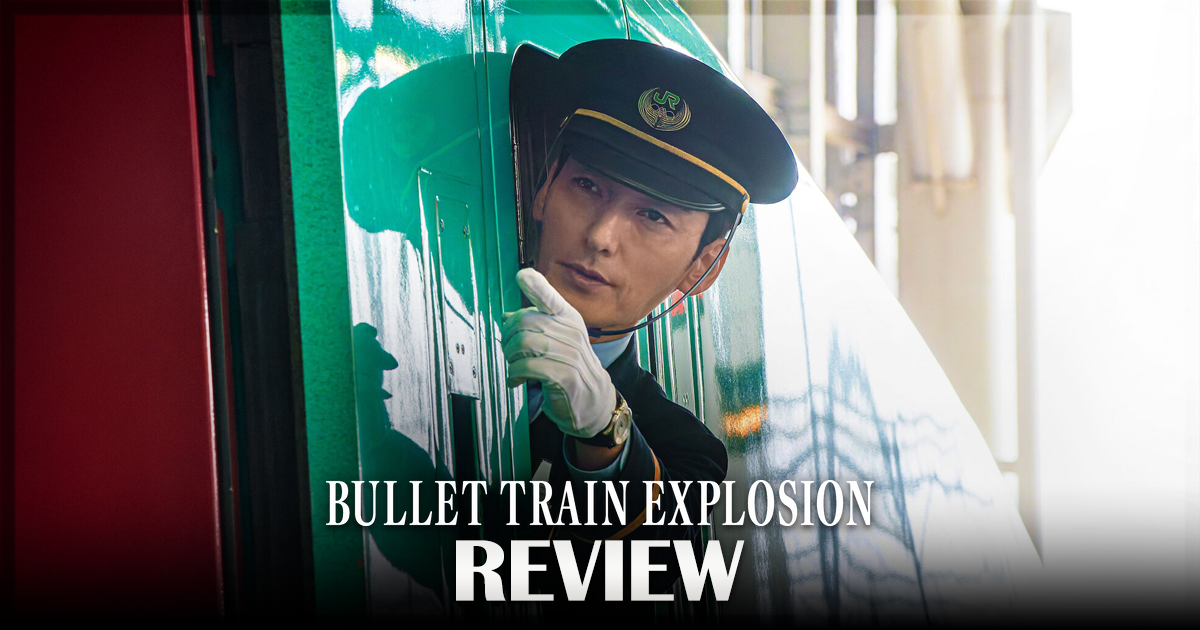Bullet Train Explosion marks Japan’s return to one of cinema’s most intense rail thrillers, nearly fifty years after the release of Junya Sato’s classic The Bullet Train. This legacy sequel is directed by Shinji Higuchi (Shin Godzilla, Shin Ultraman) and penned by Kazuhiro Nakagawa and Norichika Ōba. While the concept is adjusted for today’s world, the narrative premise closely mirrors the original, once again placing a high-speed train at the heart of an explosive threat. A mysterious terrorist has planted a bomb on the bullet train – Shinkansen in the native language – Hayabusa 60, set to detonate if the train slows down below 100 km/h.
The 1975 movie is often cited as one of the primary inspirations for modern vehicle-based thrillers, directly influencing the popular Speed, starring Keanu Reeves and Sandra Bullock. Blending social commentary, rising tension, and a story confined to the physical space of a train, the Japanese classic helped shape a subgenre that combines claustrophobic action with moral dilemmas.
Bullet Train Explosion therefore had big shoes to fill. Its respectful distance from the original allows new viewers to engage with the story without prior knowledge, though longtime fans of Sato’s film will certainly appreciate the not-that-subtle nods throughout. That said, it’s still highly recommended to watch the 1975 movie if possible. Among the many similarities between the two, the most striking difference lies in tone and narrative impact.
Where the classic dives into emotionally and morally intense scenarios, Bullet Train Explosion opts for a more restrained approach – with fewer casualties and a slightly more commercial focus – through admittedly impressive action sequences that indeed deserve praise. Unlike the 1975 production, this sequel received support from the Japanese railway company, which lent real Shinkansen and locations for filming. However, the lack of higher stakes robs the film of some of the dramatic weight that defined the original, making this sequel more accessible, but at times, more superficial.
Among the train’s passengers are characters that range from generic to underdeveloped. Jun Kaname plays a narcissistic influencer whose arc of courage feels more like a script requirement than a natural evolution. A man seeking redemption for past mistakes ends his story without any satisfying resolution. A teacher, who could have symbolized institutional indifference or civil negligence, is left as a narrative void. Even the protagonist, played by Tsuyoshi Kusanagi – the first-line manager of the train – initially promises complexity but, aside from one or two moments, lacks deeper growth.
That said, performances across the board are generally convincing. Kusanagi leads Bullet Train Explosion with a subdued but nuanced performance, even when the script doesn’t give him enough room to fully explore the character’s moral complexity. Non, as the train conductor, delivers an emotionally restrained but striking turn. The screenplay plants several narrative seeds – a political scandal, a passenger’s trauma tied to past sins, an intriguing link to the previous movie – but not all of these storylines receive the development they need to become truly compelling.
The reveal of who’s behind the terrorist plot and the motivations for such a criminal act are clearly what guide Bullet Train Explosion to safer ground. These justifications are rooted in sensitive, timely issues like domestic violence, grief, and the lack of recognition for true heroes. This thematic layer brings a much-needed emotional weight to the narrative, reminding audiences – if only briefly – that cinema can also be a powerful vehicle for social reflection. Personally, I found Higuchi’s insistence on explicitly explaining the antagonist’s reasons unnecessary – the forced clarity of a late dialogue exchange underestimates the audience and dulls the moral ambiguity that could have left a deeper impression.
From a technical perspective, there’s much to praise. Higuchi demonstrates a sharp command of tension, orchestrating suspenseful moments with surgical precision. The most gripping sequences are crafted with skill, aided by effective editing and a clear visual language that invites the viewer to understand complex situations through clever clues and miniatures. The director’s steady hand keeps the tension high enough to hold the audience’s attention until the end, even if the resolution feels safer and more predictable than it should.
Final Thoughts on Bullet Train Explosion
Bullet Train Explosion is a legacy sequel that honors the spirit of the original without being bound by it, opting for a more accessible, modern approach. The suspense scenes are effective, the cast delivers solid performances, and there’s a remarkable – if not fully successful – attempt to tackle relevant social themes amid the intense action. Nevertheless, the lack of stronger character development, the tendency to over-explain, and a somewhat inconsequential narrative prevent the movie from achieving the emotional impact it aspires to. It entertains, and at times provokes reflection, but it could – and perhaps should – have gone further.
Rating: B-
Bullet Train Explosion is now playing on Netflix.
Learn more about the film, including how to watch, at the official website for the title.


